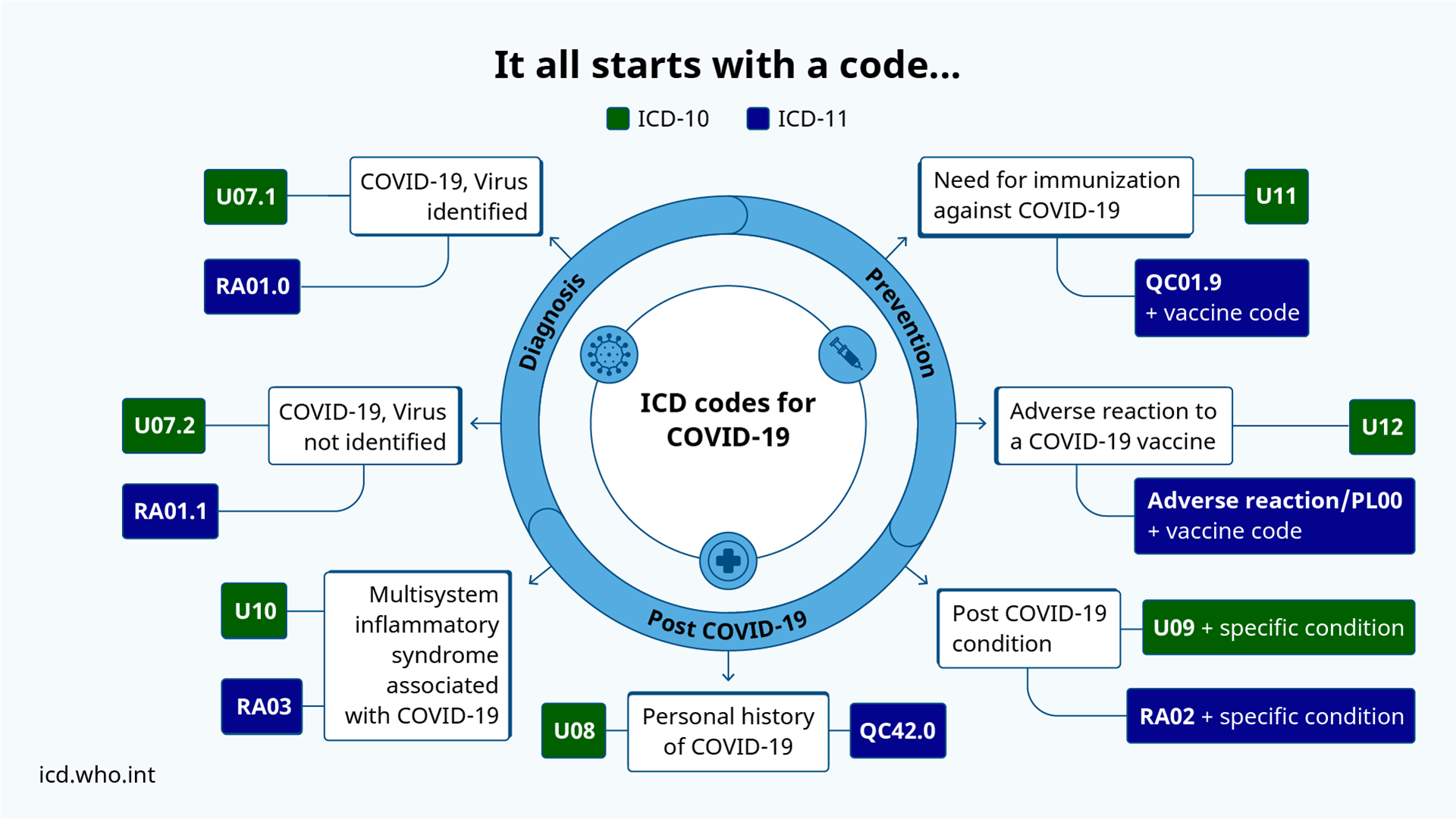International Statistical Classification of Diseases and Related Health Problems (ICD)

ICD serves a broad range of uses globally and provides critical knowledge on the extent, causes and consequences of human disease and death worldwide via data that is reported and coded with the ICD. Clinical terms coded with ICD are the main basis for health recording and statistics on disease in primary, secondary and tertiary care, as well as on cause of death certificates. These data and statistics support payment systems, service planning, administration of quality and safety, and health services research. Diagnostic guidance linked to categories of ICD also standardizes data collection and enables large scale research.
For more than a century, the International Classification of Diseases (ICD) has been the basis for comparable statistics on causes of mortality and morbidity between places and over time. Originating in the 19th century, the latest version of the ICD, ICD-11, was adopted by the 72nd World Health Assembly in 2019 and came into effect on 1st January 2022.

ICD purpose and uses
As a classification and terminology ICD-11:
- allows the systematic recording, analysis, interpretation and comparison of mortality and morbidity data collected in different countries or regions and at different times;
- ensures semantic interoperability and reusability of recorded data for the different use cases beyond mere health statistics, including decision support, resource allocation, reimbursement, guidelines and more.
ICD-11 Highlights
- Legally mandated health data standard (WHO Constitution and Nomenclature Regulations).
- In effect from January 2022.
- Conceptual framework independent of language and culture.
- Integration of terminology and classification.
- End-to-end digital solution (API, tools, online and offline).
- Up-to-date scientific knowledge.
- Comparable statistics and semantic interoperability - for 150 years.
- ICD-11 is accessible to everybody.
- ICD-11 is distributed under Creative Commons Attribution-NoDerivs 3.0 IGO license.
- ICD-11 enables, for the first time, the counting of traditional medicine services and encounters.
- The 11th revision is more extensive and has greater implications for what can be done with the ICD, and how, than any revision since the 6th, in 1948.
ICD-11 use cases
Uses of the ICD are diverse and widespread and much of what is known about the extent, causes and consequences of human disease worldwide relies on use of data classified according to ICD. See below just a few examples:
Certification and reporting of Causes of Death
Morbidity coding and reporting including Primary care
Casemix and Diagnosis-Related Grouping (DRG)
Assessing and monitoring the safety, efficacy, and quality of care
Cancer registries
Antimicrobial resistance (AMR)
Researching and performing clinical trials and epidemiological studies
Assessing functioning
Coding traditional medicine conditions
Interoperability standards in WHO Digital Guidelines and for Digital Documentation of COVID-19 Certificates (DDCC)
ICD-11 webinars
News
ICD Implementation across WHO Member States

Learn more about ICD-11

ICD-11 Fact Sheet
The global standard for health data, clinical documentation and statistical aggregation.Multiple uses, including primary careThoroughly and scientifically...

ICD-11 Terms of Use and License Agreement
Eleventh Revision of the International Statistical Classification of Diseases and Related Health Problems (ICD-11) Digital Version Terms of Use and License...

The latest version of the ICD, ICD-11, was adopted by the 72nd World Health Assembly in 2019 and came into effect on 1st January 2022. ...
ICD-11 an international classification of diseases for the twenty first century
ICD-11 extension codes support detailed clinical abstraction and comprehensive classification
Emergency use ICD codes for COVID-19 disease outbreak
Since the beginning of the pandemic and in response to member state requests, the classification and terminologies unit has been progressively activating emergency codes for COVID-19 in ICD-10 and ICD-11 after consultation with the relevant committees and reference groups of the WHO Family of International Classifications (WHO-FIC) Network.
ICD-10
All Member States are committed to using the most recent version of ICD. 2022 is the first year where ICD-11 is officially in effect.
- ICD-10 Browser (Latest version, 2019)
- ICD-10 Training
- List of Official ICD-10 Updates
- FAQ on ICD
- ICD-10 Update platform (Archive)
Previous online versions of ICD-10:

- ICD-10 Browser (Latest version, 2019)
- ICD-10 2016
- ICD-10 2015
- ICD-10 2014
- ICD-10 2010
- ICD-10 2008
ICD History
First World Health Assembly
Convention of 30 April 1948
The Delegates entrusted WHO, as one of its functions, with the task of establishing and revising the necessary international nomenclatures of diseases and causes of death, giving the World Health Assembly authority to adapt regulations in respect, such as nomenclatures, for consideration and action, the International Statistical Classification of Diseases, Injuries and Causes of Death and accompanying recommendations, destined to improve international uniformity and comparability of statistics of morbidity and mortality.
ICD revisions under the auspices of WHO
| ICD Revision | ICD Coming into effect | ICD Adoption |
| 6th Revision | into effect 1948 | adopted 1948 (WHA1.36) |
| 7th Revision | into effect 1 Jan 1958 | adopted May 1956 (WHА9. 29) |
| 8th Revision | into effect 1 Jan 1968 | adopted May 1966 (WHA19.44) |
| 9th Revision | into effect 1 Jan 1979 | adopted May 1976 (WHA29.34) |
| 10th Revision | into effect 1 Jan 1993 | adopted May 1990 (WHA43.24) |
| 11th Revision | into effect 1 Jan 2022 | adopted May 2019 (WHA72.15) |

